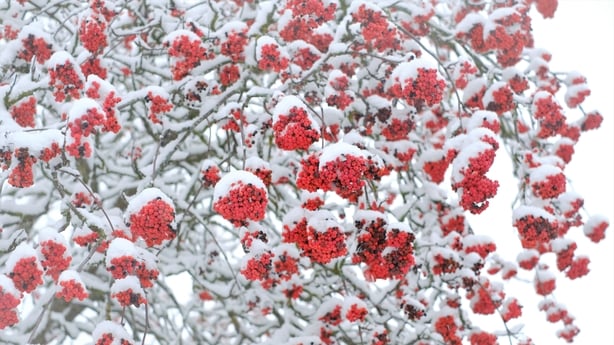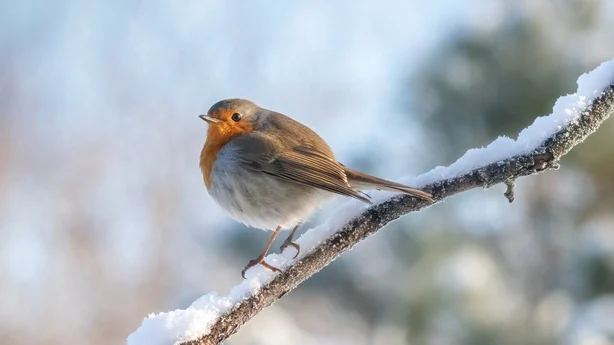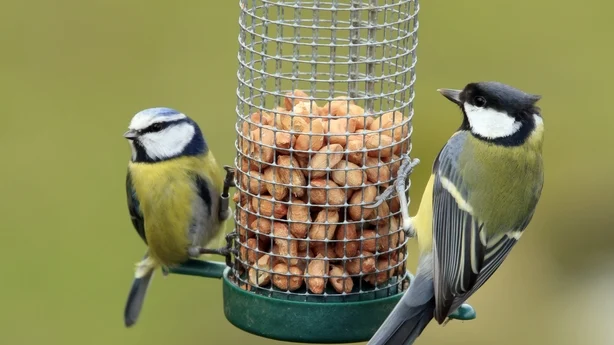As the colder weather makes itself felt across the country, many people will be asking themselves what they should be doing to make their gardens winter ready.
And Claire Byrne and her guests stand ready to advise. Claire was joined by gardening expert and regular guest Marie Staunton and also by Birdwatch Ireland's Irish Garden Bird Survey coordinator, Brian Burke.
Marie’s first piece of advice was about protecting your garden from the frost that, if it hasn’t appeared already, can’t be too far off:
"The first thing that’s after happening is the cold snap will get rid of the dahlias. So the dahlias will all start going mushy and that sort of thing. So you’ve a choice – you can take them up or you can leave them in there and hope for the best that they don’t get absolutely drowned in water for the winter."

A lot of people, Marie says, just put a heap of mulch on their dahlias to protect the tuber, but if the tuber gets too much rain and becomes thoroughly drenched through, it will just rot away. So, the advice is, if you really like it, take it up.
And if you’re thinking that you might give your lawn a last cut before the lawn mower goes into hibernation, now is not the best time, Marie says, because a lack of wind means that nothing is really drying in the garden:
"So you’re going to have to wait, if you want to give it the last cut, just wait till it dries up a bit, get the leaves off it and then – leave some leaves obviously for insects over winter, hibernating over the winter – but generally it’s a tidy-up affair and now’s the time to move stuff quickly before we get the frost, heavy frosts."

The clock, Claire observes, is well and truly ticking. But will the colder weather mean more birds arriving into our gardens, patios, balconies? Brian Burke says Birdwatch Ireland have been fielding the usual emails from concerned householders wondering about the absence of birds – something which is completely normal:
"We’re just saying wait. When the temperatures drop a bit, you’ll see the birds back pretty quickly and we’re definitely seeing that this week in particular."
With the mild winters of the last few years, Brian says, things have been poor for garden birds at autumn time, but whenever the temperature drops – which sometimes hasn’t happened until December – the birds will start appearing.
But when they do, Claire wants to know, should we be feeding them or should we just let them at it? There isn’t universal agreement on that, Brian says, but:
"Listen, we’re interfering with nature up and down the country on a daily basis for hundreds of years now, you know, so there’s definitely some birds that maybe we owe a helping hand to. You know, some people feed all year round and some people just stick to the cold weather – and that’s when birds really need it."

A listener wants Marie to tell them if they should clear fallen leaves from the grass or if they should let them stay there for the winter and let nature deal with them. Clear them is the unambiguous advice from Marie:
"You’re better off clearing them off the lawn and you can put them into bags and pierce the bags and put them somewhere in the garden out of the way. Because that’s really good mulch, that’s really good kind of mulch for the garden next year."
It takes between eight and twelve months for leaves to break down and be usable as mulch. As for leaving them on the grass – it'll mean you get a lot of moss, Marie says, so best to take the expert’s advice.
Another listener asks Brian’s advice on the best place in the garden to put a bird feeder. Keep it close to the trees, is the response:
"Get it within a metre or two of trees and shrubs and stuff like that. If you put it bang in the middle of the lawn, the birds kind of have a long way to fly to it, they’re going to be afraid a predator like a sparrow hawk will pop up and catch them. So, if they’re closer to a tree or a shrub, they’re going to feel safer just hopping out, getting some food and hopping back in."
There’s lots more good advice from Marie and Brian’s chat with Claire, which you can hear if you tap or click above.



